Key takeaways
- Utilitarianism focuses on maximizing happiness and reducing suffering, emphasizing outcomes over intentions.
- Mill distinguishes between higher and lower pleasures, advocating for the prioritization of intellectual and moral satisfaction over mere physical pleasures.
- Applying utilitarianism in education encourages critical thinking about the balance between individual rights and collective happiness, fostering engaging discussions.
- Reflecting on Mill’s principles prompts a deeper understanding of moral choices, emphasizing the significance of meaningful fulfillment over immediate gratification.
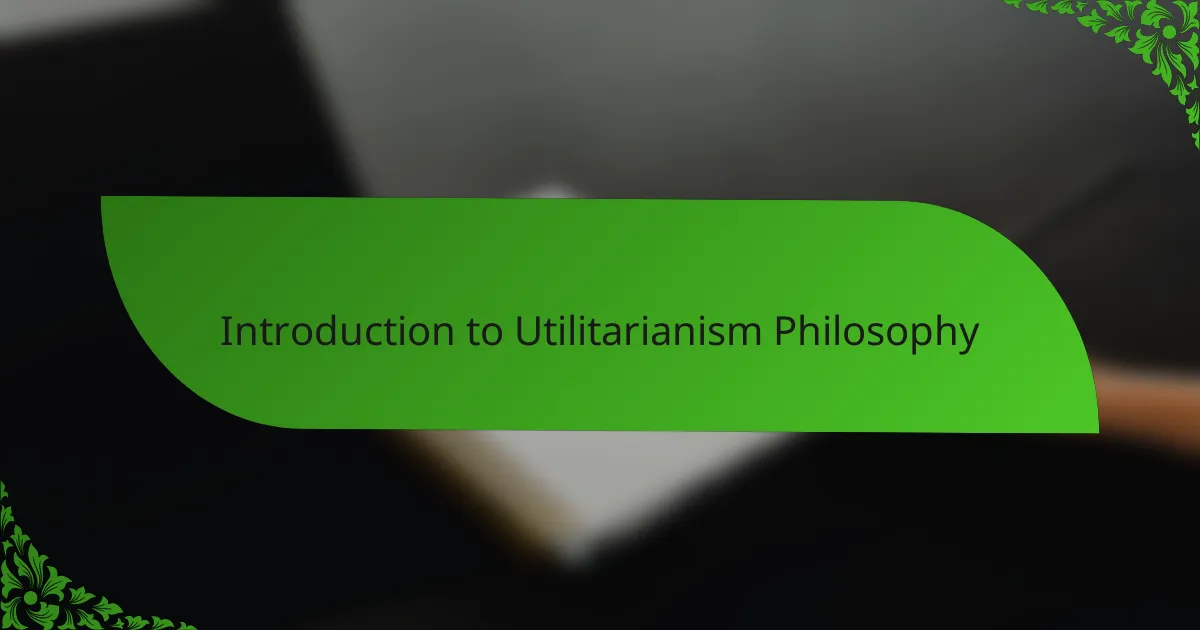
Introduction to Utilitarianism Philosophy
Utilitarianism is a philosophy that seeks to maximize happiness and reduce suffering. When I first encountered it, I was struck by its straightforward appeal—making choices based on the greatest good for the greatest number felt both practical and humane. But have you ever wondered how we measure happiness or weigh one person’s joy against another’s pain?
What fascinates me most about utilitarianism is its emphasis on outcomes rather than intentions. It pushes us to think beyond our immediate feelings and consider the broader impact of our actions. This perspective often challenges my own assumptions about right and wrong, making moral decisions far more complex than they initially seem.
In exploring utilitarianism, I’ve found myself asking difficult questions: Is it always better to sacrifice the few for the many? And can every consequence truly be predicted or accounted for? These reflections have deepened my appreciation for Mill’s nuanced approach and the ongoing conversation about ethics in our everyday lives.
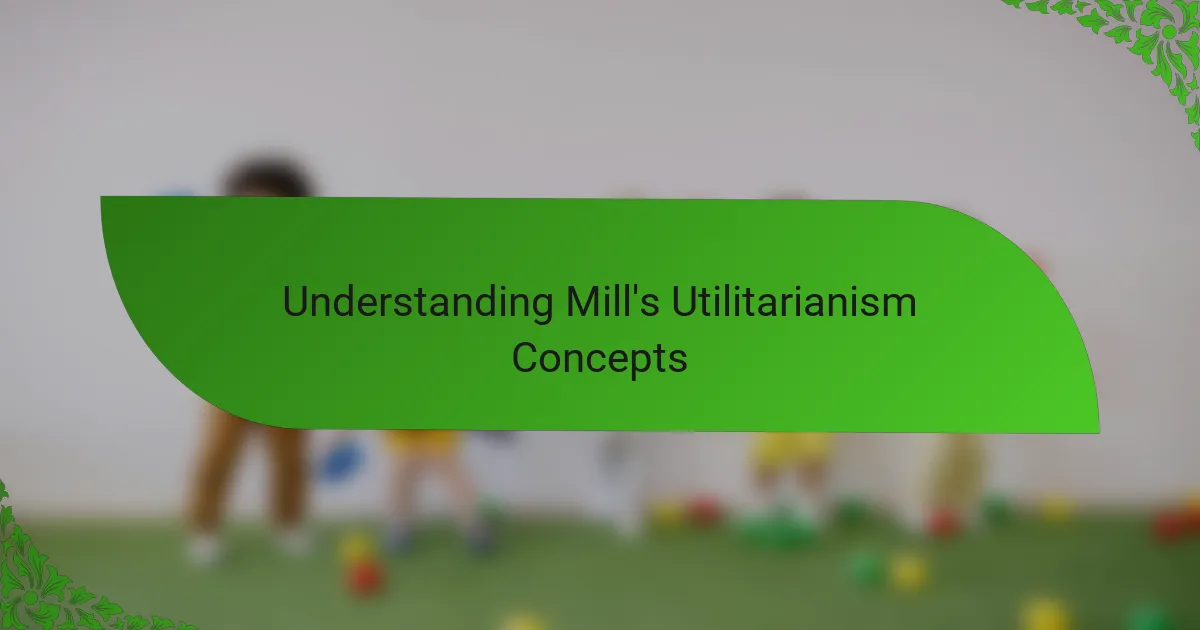
Understanding Mill’s Utilitarianism Concepts
When I first delved into Mill’s version of utilitarianism, what caught my attention was his insistence on quality over quantity in happiness. Unlike earlier utilitarians who treated all pleasures as equal, Mill argued that intellectual and moral pleasures hold greater value than mere physical satisfaction. This idea made me pause—how do we truly know which pleasures are better, and does this hierarchy change depending on who you ask?
Another aspect that resonated with me was Mill’s commitment to individual rights within a utilitarian framework. At first, I wondered if protecting personal freedoms might clash with maximizing overall happiness. Yet, Mill convinced me that respecting liberty often leads to the greatest good because it nurtures creativity and personal growth, which benefit society in the long run.
Reflecting on these concepts, I keep asking myself: How does Mill’s emphasis on higher pleasures reshape the way we evaluate our daily choices? For me, it’s not just about chasing immediate satisfaction but considering which actions cultivate deeper, lasting fulfillment. This shift in perspective has made utilitarianism feel less coldly mathematical and more profoundly human.
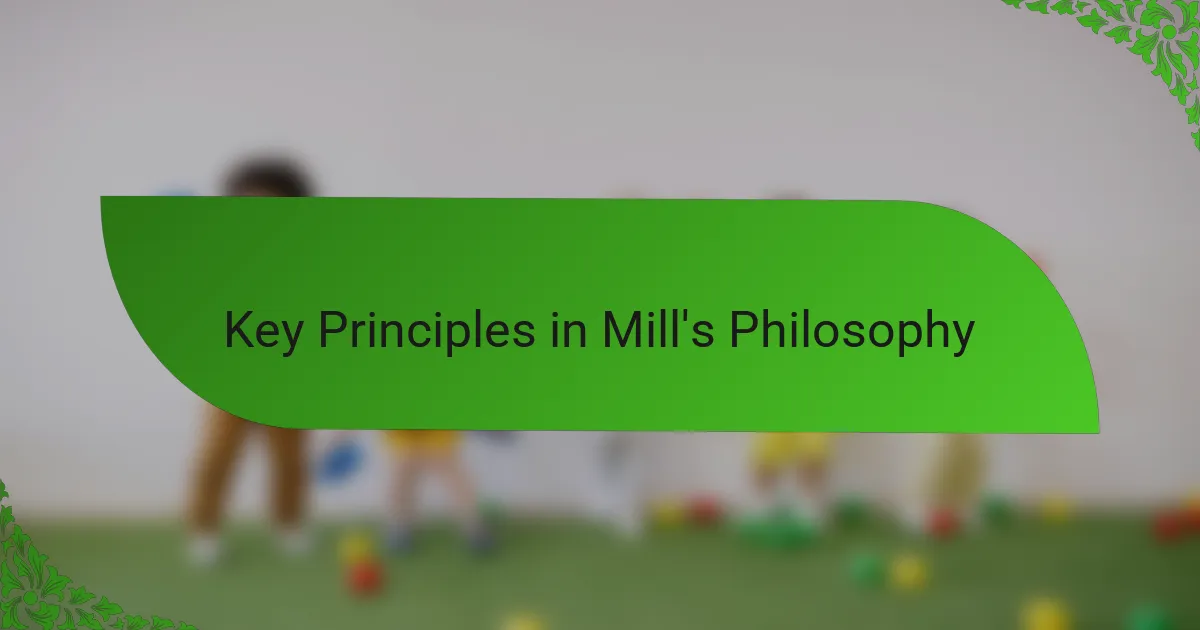
Key Principles in Mill’s Philosophy
One principle that stood out to me in Mill’s philosophy is the “greatest happiness principle,” which suggests actions are right if they promote overall happiness. This seemed straightforward at first, but then I wondered: how do we fairly measure happiness across different people? Mill’s idea pushed me to think beyond simple calculations and consider the quality and depth of happiness experienced.
Another key idea I found compelling is Mill’s distinction between higher and lower pleasures. Initially, it felt elitist to claim some pleasures are superior, but then I reflected on my own experiences—sometimes a good book brings more lasting joy than a fleeting thrill. This hierarchy challenged me to appreciate the nuances in human fulfillment and reconsider what truly enriches life.
Finally, Mill’s respect for individual liberty within utilitarianism caught my attention. It made me ask: can freedom really coexist with the pursuit of the greatest good? In grappling with this, I realized that liberty fosters personal growth, which ultimately benefits society. This insight deepened my understanding of how ethics intertwine with human dignity and creativity.
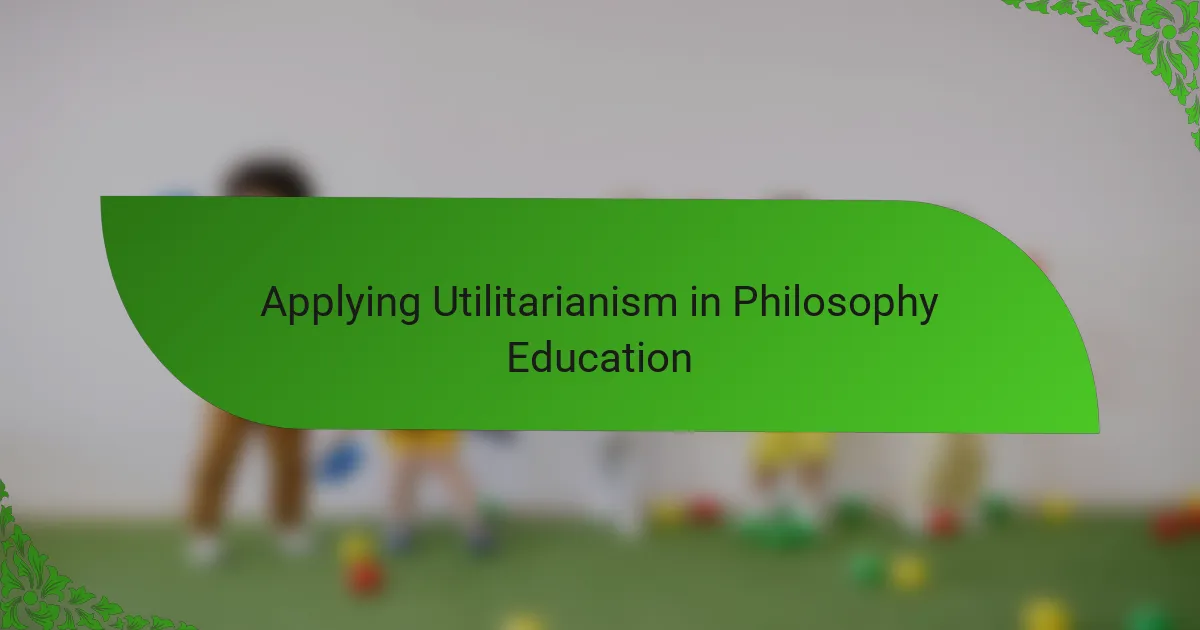
Applying Utilitarianism in Philosophy Education
Applying utilitarianism in philosophy education offers a chance to move beyond abstract theories and into real-world dilemmas. When I’ve used Mill’s framework in classroom discussions, I notice that students begin questioning not just what happiness is, but whose happiness we should prioritize—and why. This often sparks lively debates that illuminate the challenges of quantifying pleasure and pain.
In my experience, applying utilitarianism encourages learners to weigh consequences carefully, fostering critical thinking skills that extend far beyond the philosophy classroom. I’ve seen students wrestle with tough questions like: Is it acceptable to sacrifice one individual’s rights for the greater good? These discussions reveal the tension between collective well-being and individual freedoms, making the theory come alive in a deeply personal way.
One particularly memorable moment came when a student pointed out how Mill’s emphasis on higher pleasures challenges us to look past instant gratification toward more meaningful, lasting happiness. This insight reminded me that philosophy education grounded in utilitarianism doesn’t just teach concepts—it invites us to reflect on how we live and make choices every day.
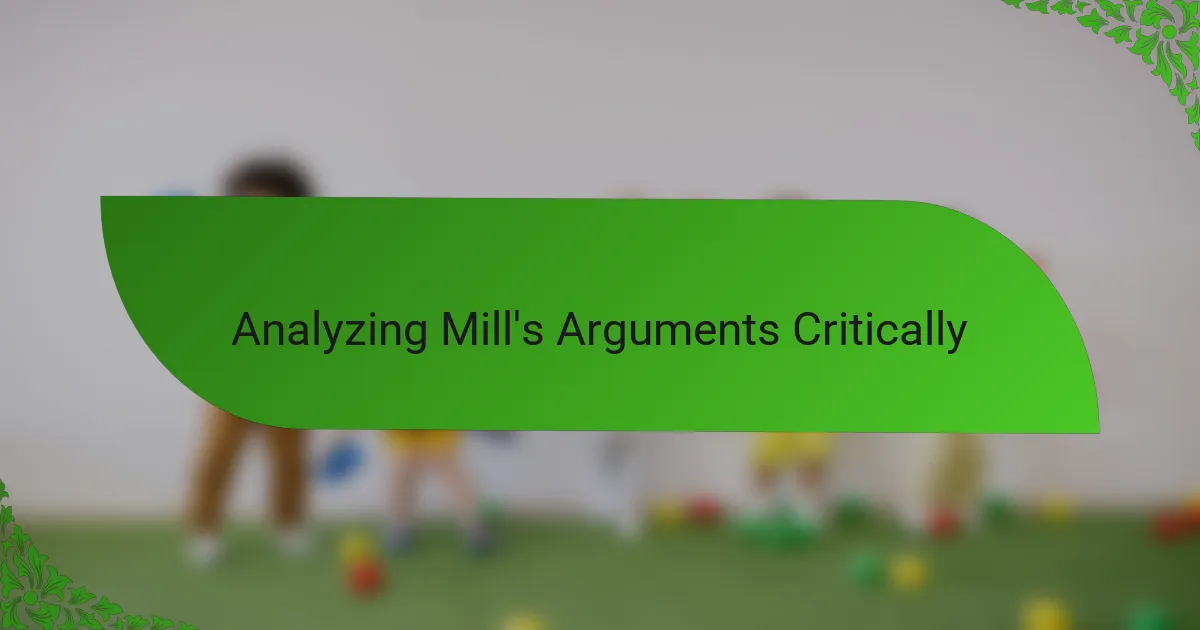
Analyzing Mill’s Arguments Critically
When I critically examined Mill’s arguments, I found myself grappling with the challenge of balancing individual rights against the aggregate happiness he champions. Is it truly feasible to protect personal liberty without sometimes sacrificing the greater good? This tension made me appreciate the subtlety in Mill’s reasoning, even if it left me uneasy about clear-cut answers.
What struck me most was Mill’s attempt to rank pleasures, elevating intellectual joys above mere physical ones. At first, I questioned whether this hierarchy risks being subjective or exclusionary. Yet reflecting on my own experiences, I realized that some forms of happiness do seem more fulfilling and enduring, which added depth to my understanding—and also to my doubts—about how we judge value.
Despite these strengths, I can’t help but wonder if Mill’s reliance on the predictability of consequences oversimplifies human complexity. Can anyone truly foresee all outcomes, or do we risk unintended harm by placing so much faith in calculated results? This critical perspective doesn’t weaken utilitarianism for me; rather, it highlights why Mill’s philosophy remains a living conversation, inviting ongoing debate and refinement.
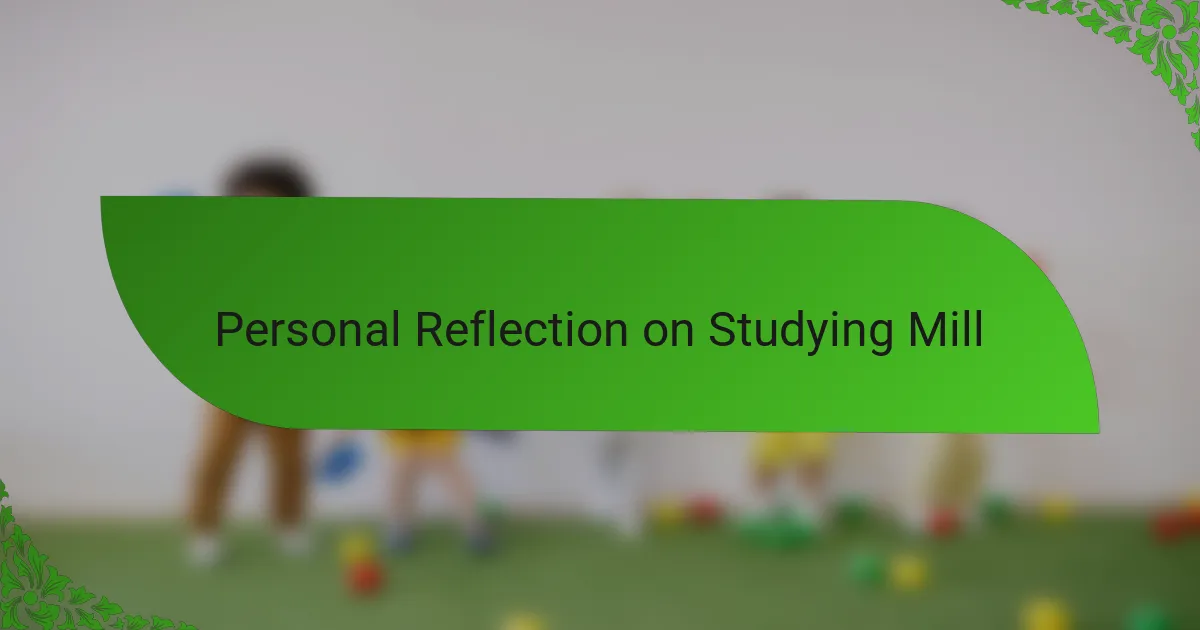
Personal Reflection on Studying Mill
Studying Mill felt like stepping into a dialogue that’s both challenging and rewarding. I remember wrestling with his idea of higher pleasures, imagining moments when a quiet evening of reading stirred me more deeply than any thrill. It made me rethink how often I prioritize short-term enjoyment over meaningful fulfillment.
There were times when I felt conflicted, especially confronting the tension between individual rights and the greater good. Could I honestly accept sacrificing one person’s freedom for the happiness of many? These questions lingered, pushing me to consider the fragile balance at the heart of Mill’s thought.
Ultimately, reflecting on Mill’s utilitarianism became a personal journey—not just intellectual but emotional, too. It challenged me to question my assumptions, to recognize the complexity behind moral choices, and to appreciate how ethics can shape how we live and care for others. Have you ever experienced that kind of shift while studying philosophy? For me, Mill’s work was exactly that transformative.
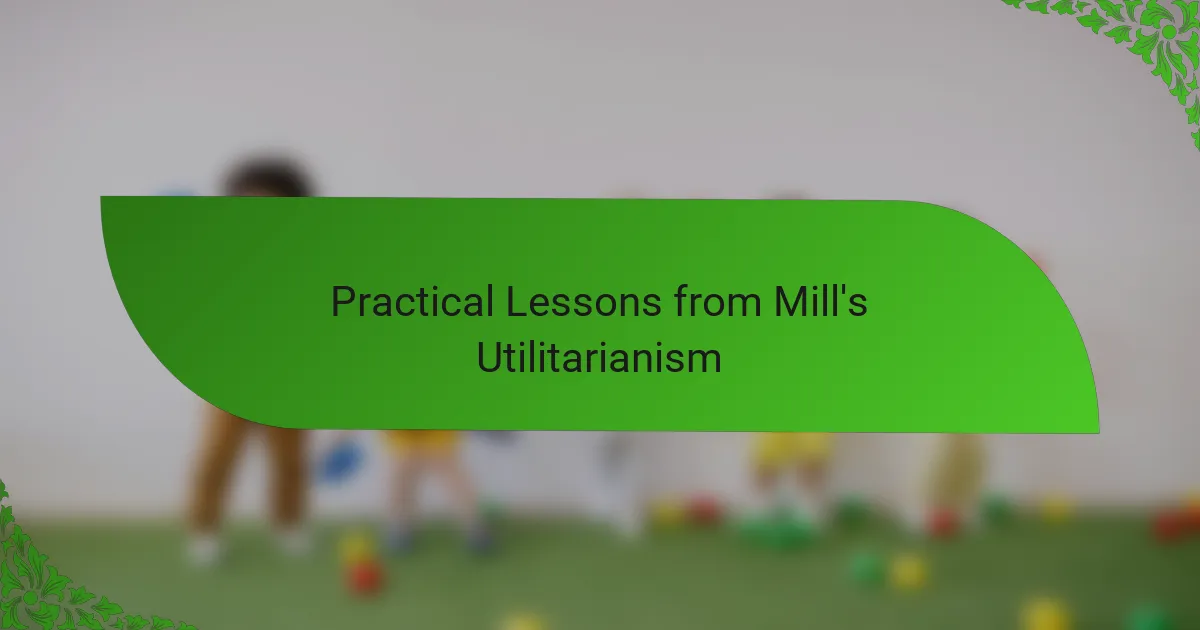
Practical Lessons from Mill’s Utilitarianism
One practical lesson I took from Mill’s utilitarianism is the importance of considering the quality of happiness, not just the quantity. I remember catching myself reevaluating everyday choices—why chase fleeting pleasures when deeper, more meaningful joys might bring lasting fulfillment? This shift in thinking feels like a subtle but powerful guide for living thoughtfully.
Another insight that struck me involves Mill’s respect for individual liberty. Have you ever paused to wonder if protecting freedom might actually enhance overall happiness? Embracing this idea helped me see that allowing people the space to grow and express themselves can ultimately deepen the common good, rather than undermine it.
Finally, the challenge of predicting outcomes reminded me how flexible and cautious we need to be when applying utilitarian principles. I often find myself asking: can we truly foresee all consequences, or should humility temper our moral calculations? Accepting this uncertainty keeps me grounded and open to ongoing reflection, which I believe is one of Mill’s greatest practical gifts.